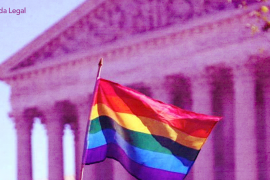
6 Things You Need to Know About the Brief Lambda Legal Filed at the Supreme Court Today
Blog Search
Today, Lambda Legal, the ACLU and Ohio-based Gerhardstein & Branch filed their brief with the U.S. Supreme Court in Henry v. Hodges and Obergefell v. Hodges arguing that Ohio’s ban on recognizing the legal marriages of same-sex couples violates the Due Process and Equal Protection Clauses of the U.S. Constitution. Here's what you need to know about the brief:
1. It was filed in two Ohio federal cases: Henry v. Hodges and Obergefell v. Hodges.
In November, the U.S. 6th Circuit Court of Appeals upheld laws banning marriage rights for same-sex couples in Kentucky, Michigan, Ohio and Tennessee.
The Court’s decision stood in stark contrast to the blizzard of federal and state court decisions that have found identical laws unconstitutional over the last year and a half.
On January 16, the U.S. Supreme Court announced it would hear the appeals from all six marriage cases decided by the 6th Circuit:
- Kentucky: Bourke v. Beshear and Love v. Beshear, litigated by the ACLU and co-counsel
- Michigan: DeBoer v. Snyder, litigated by GLAD and co-counsel
- Ohio: Henry v. Hodges, litigated by Lambda Legal and the firm Gerhardstein & Branch; and Obergefell v. Hodges, litigated by the ACLU and Gerhardstein & Branch
- Tennessee: Tanco v. Haslam, litigated by NCLR and co-counsel
Our brief involves only the two Ohio cases. Our colleagues filed briefs in the other cases.
Both Ohio cases, Henry and Obergefell, show the importance of marriage throughout a family’s life span, from the time they marry to the birth of their children through the death of a spouse and beyond — from cradle to grave. The Henry plaintiffs seek respect for their out-of-state marriages, including recognition for both spouses as parents of the couples’ children on birth certificates. The Obergefell plaintiffs are widowers fighting to be listed on the death certificates of their deceased husbands, whom they married out of state.
2. It responds to one question, posed by the Supreme Court.
In its order, the Supreme Court asked that the briefs in the cases respond to the following questions:
- Does the Fourteenth Amendment require a state to license a marriage between two people of the same sex?
- Does the Fourteenth Amendment require a state to recognize a marriage between two people of the same sex when their marriage was lawfully licensed and performed out-of-state?
The first question applies only to the cases from Kentucky and Michigan, which involved couples seeking the right to marry. The second applies to the Ohio cases, as well as to the Kentucky and Tennessee cases, all of which involved spouses who already were married.
3. It relates specifically to bans on recognition of existing marriages for same-sex couples in Ohio.
Prior to 2004, Ohio followed the firm practice of recognizing all marriages entered out of state, even if the marriages would have been void if performed in Ohio. That changed in 2004, with Ohio’s enactment of recognition bans on marriages for same-sex couples.
While a separate part of the 2004 bans prohibit same-sex couples from marrying in the state, the bans also deny married same-sex couples any legal recognition of marriages entered in other jurisdictions. That was the aspect of the laws challenged in these cases. Ohio’s recognition bans were part of a wave of similar state restrictions on marriage rights for same-sex couples, following the 2003 Massachusetts ruling in Goodridge v. Dep’t of Pub. Health, which held that same-sex couples have the right to marry.
4. We present four main arguments.
- Ohio’s recognition bans are unconstitutional under the Supreme Court’s decision in United States v. Windsor, which struck down the so-called federal Defense of Marriage Act’s refusal to recognize marriages of same-sex couples for federal purposes. The Court held in Windsor that guarantees of liberty and equality prohibit the federal government from demeaning the dignity and integrity of the families of married same-sex spouses and denying them federal marriage protections. The same principles that compelled the Court’s conclusion in Windsor also compel the conclusion that state bans refusing recognition to the marriages of same-sex spouses violate constitutional guarantees of liberty and equality.
- Ohio’s recognition bans infringe on the liberty to be married and so should be subject to “heightened scrutiny,” a higher level of judicial review, under the Due Process Clause of the U.S. Constitution.
- Ohio’s recognition bans are also subject to heightened scrutiny under the Equal Protection Clause of the U.S. Constitution because they discriminate based on sexual orientation and sex. The Court should make explicit that laws that target gay and lesbian people are presumptively unconstitutional.
- Ohio’s recognition bans fail even the most basic standard of judicial review. There is simply no legitimate basis to refuse to respect the marriages of same-sex couples.
5. Restoring the rights the Ohio bans strip from the minority cannot be left to the timetable of the democratic process.
Ohio and the circuit court’s decision contend that legal recognition of the marriages of same-sex couples must wait for the political majority to bestow equal rights on these families. As we state in our brief:
They assert that the federal courts should stand aside while same-sex spouses and their children suffer daily hardships and indignities imposed by the unconstitutional refusal of states like Ohio to recognize these couples’ marriages. Wait, they say, until the majority decides the time is right.
[Our clients], their children, and many like them have waited too long already. Ohio widowers James Obergefell and David Michener ran out of time when death took their spouses. The infants born to the Henry-Rogers, Yorksmith, and Noe-McCracken families could not wait to arrive in this world until a majority voted that their parents‘ marriages would be honored. And [the Talmas-Vitale family’s adopted son] could not wait for a home until a majority of Ohioans chose to recognize the marriage of his New York adoptive fathers. No more children should be demeaned by states like Ohio; no more loving spouses should die without the dignity that accompanies respect for their marriages, while the democratic process grinds its slow way towards justice.
6. These bans, regardless of where they are enacted, hurt people all over the country.
For same-sex couples living outside states with marriage bans, a road trip to visit relatives, a short drive to work or a visit to a hospital in a neighboring state all risk erasing their marriages and the protections that come with them. The discriminatory impact of Ohio’s bans is felt across the country as same-sex married couples and their children bear the anxiety that, in an instant of unexpected heartache, they may be treated as legal strangers.
As we say in our brief, “When a couple knits their lives together through marriage, making promises of enduring support and care, they vow to be wed until death—not state lines—‘do us part.’”




